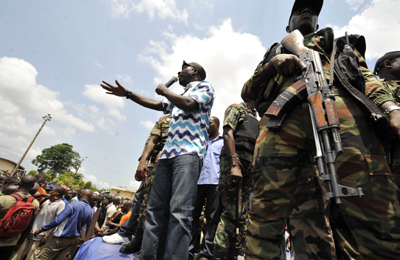Reporting on the power struggle in Ivory Coast is increasingly perilous, with journalists facing a climate of threats, intimidation, and attacks that has forced many to choose between adopting partisan coverage or fleeing to safety. “Here, we are in a situation where if you are not with one camp, then you are against them. You must show you are partisan,” reporter Stéphane Goué told CPJ today.
Goué heads a local press freedom group called the Ivorian Committee for the Protection of Journalists (CIPJ), which has documented and spoken out against abuses committed by supporters of both President Laurent Gbagbo and challenger Alassane Ouattara. Goue said he fears for the safety of all journalists following Sunday’s call by Gbagbo youth militia leader Charles Blé Goudé to arm the president’s supporters.
Goué told CPJ he has gone into hiding himself after being threatened in response to his public statements. In comments made on the UN-sponsored radio station, Goué criticized Gbagbo’s efforts to restrict the press and questioned the antistate charges lodged against jailed journalists Aboubacar Sanogo and Yayoro Charles Lopez Kangbé of the rebel-held TV Notre Patrie.
Since the disputed November 2010 presidential runoff between Gbagbo and Ouattara, Abidjan is a battleground between security forces loyal to Gbagbo and rebel forces backing Ouattara. UN peacekeepers have attempted to protect civilians, but they are facing hostility from Gbagbo supporters who resent the UN’s recognition of Ouattara as president-elect. In the partisan divide, media outlets supporting Gbagbo are identified as “blue,” while pro-Ouattara outlets are “green.”
“We are working in very precarious conditions,” said Guillaume Gbato, a journalist with the “blue” daily Notre Voie. In February, a printing press employee of La Refondation, publisher of Notre Voie, was killed by a mob in the Abidjan suburb of Koumassi. Legré’s affiliation with the newspaper was known in the area, said Gbagto, who believes Ouattara supporters could be responsible. These days, Notre Voie‘s offices in the Cocody district of Abidjan are thin on staff because of difficulties linked to security and transportation, Gbato said.
Nando Dapa, editor of the daily Le Démocrate, a “green” newspaper also based in Cocody, told me he was briefly seized and threatened by captors on February 24 as he drove toward Abobo. Dapa said armed youths at an impromptu checkpoint stopped his car. “They found out that I was a journalist and when I said the name of my newspaper, they replied, ‘Very good. We are, in fact, looking for you.'” Dapa said the youths fired shots in the air and forced Dapa into a dark hall where he was roughly interrogated and threatened.
The UN-sponsored radio station, ONUCI FM, has encountered security problems as well. “We have problems getting around in the pro-Gbagbo neighborhoods because of barricades erected by the Young Patriots [Gbagbo militia] and security forces,” the station’s director, Sylvain Semilenko, told me. “Since February 6, the Gbagbo camp refuses to come on our airwaves on the pretext that we are illegal,” he said, referring to a ruling of the Gbagbo-controlled broadcast regulator to strip the station of broadcast license. “To balance reporting, we use NGOs which have access to the Gbagbo camp or we quote their public statements given to other media outlets,” he added. Although the station has broadcast freely, Semilenko said the homes of station personnel have been raided by unidentified armed men.
Even the country’s main distributing company, Edipresse, which prints and delivers both “blue” and “green” in the same facility, has been drawn into the struggle for media control. Armed police officers loyal to Gbagbo surrounded the Edipresse warehouse and blocked the distribution of pro-Ouattara newspapers for two days, Léo Kamon, an Edipresse official, told CPJ.
